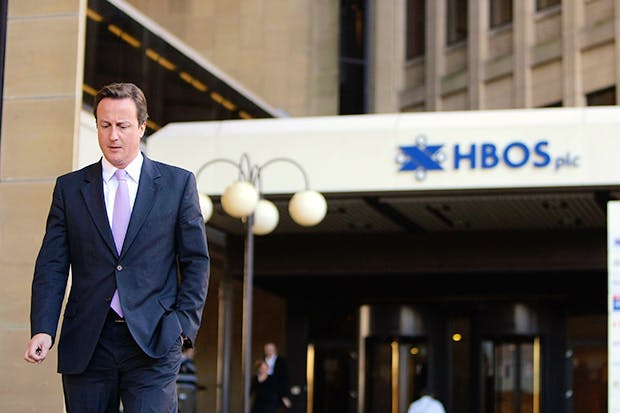‘Everyone remembers the names of Applegarth of Northern Rock and Goodwin of RBS, but history may judge the HBOS men to have been the worst of the lot,’ I wrote four years ago. Judgment has arrived at last in a Bank of England report on the 2008 HBOS collapse — plus a second report, by Andrew Green QC, on the adequacy of investigations by the now-defunct Financial Services Authority.
The Bank does not go as far as I did with ‘worst of the lot’. But there’s a hint that way in deputy governor Andrew Bailey’s foreword, which calls this ‘a story of the failure of a bank that did not undertake complicated activity or so-called racy investment banking: HBOS was at root a simple bank…’ By that he means a bank built, both in the former Halifax building society and in the Bank of Scotland, on age-old principles of prudent lending against bricks and mortar.
HBOS didn’t go bust doing new things, but doing old things recklessly. The Bank’s report says executives embarked on ‘rapid and uncontrolled growth’ based on ‘over-exposure to highly cyclical commercial real estate at the peak of the economic cycle [and] lower-quality lending’. HBOS’s board, chaired by grand non-banker Lord Stevenson, failed to challenge this crazy course, which was also insufficiently tested by the FSA — whose decision afterwards to pursue action against only one executive (corporate lending chief Peter Cummings, who was fined £500,000 for ‘misconduct’) was, says Green, ‘materially flawed’.
There’s a whiff of Chilcot here, in the sense that the time taken to publish these reports has been extended by ‘Maxwellisation’ — allowing those mentioned to comment on drafts — and it would now be too late to impose fines on anyone else. Green clearly thinks the FSA should also have investigated chief executive Andy Hornby (now at Gala Coral, the bookmaker); and that the authorities should reconsider investigating Stevenson and half a dozen others with a view to deciding whether they are ‘fit and proper’ to hold office in financial firms.
Such processes will take years more; some on the list are retired, so ‘prohibition’, if imposed, would mean little; HBOS’s bailed-out parent Lloyds is on the road to recovery and might prefer to leave the past behind. So why prolong the torture? The answer, of course, is that leaving the past behind — forgetting or never learning lessons — caused all the trouble in the first place. The FSA failed before and after, but its successors must not give up the chase. For the education of future generations, a final apportionment of blame is the only way to bring closure to the HBOS fiasco.
Frisky giant
A cocktail of Viagra and Botox would put a fixed smile on anyone’s face. Let’s hope it has that effect for shareholders in the companies that manufacture those potions, respectively Pfizer and Allergan, which are merging to create a global healthcare giant. The deal is actually a reverse takeover driven from New York by Pfizer’s Scottish-born boss Ian Read, but putting Dublin-based Allergan on top of the new structure to take advantage of lower tax rates. If US politicians don’t block it, Irish treasury officials should also be feeling unusually frisky.
Cut-throat catalyst
I used to see Jim Slater on his way to play bridge at the Portland Club in Mayfair, but we never exchanged so much as a nod. Upright, tanned, sharp-eyed, the once–controversial financier (who has died aged 86) looked fit for his age, despite lifelong health worries — the main reason he left a high–flying motor-industry career in 1964 to found his investment firm Slater Walker, in partnership with the Tory MP Peter Walker.
Slater Walker became synonymous, after the 1973 crash, with City spivvery and the kind of risk-taking excess from which the next generation failed to learn. In the 1960s, however, it was seen as a modernising force in British industry, where management was, in Slater’s words, ‘too cosy, self-perpetuating and inefficient… and the shareholder was given a raw deal’. When the Conservatives returned to power, the Slater star rose even higher: Anthony Sampson in The New Anatomy of Britain (1971) called him ‘the very paragon of the new Heath-type Tory: self-made, hard-working, unsentimental, competitive’. It’s true Slater was a high-profile exponent of ‘asset-stripping’ and so a precursor of today’s private-equity cut-throats, but he was a catalyst for positive change.
It was to Slater’s credit, too, that he based his investment decisions on intensive research (his ‘Zulu Principle’), gambled with his own money as well as other people’s, and fought back from adversity — making a new fortune, in later years, in dotcom stocks, property and gold. His demeanour never encouraged me to introduce myself, so I cannot say whether he was congenial company; but one associate tells me he was ‘a loyal and generous friend though sometimes infuriatingly obdurate — and by his own admission, sometimes too clever for his own good’.
Thanks, Jim
Slater also had a hand in the fate of The Spectator. In 1967, when its proprietor Ian Gilmour decided to sell, he entrusted negotiations to Slater — to whom he had been introduced by Peter Walker. One of Slater- Walker’s clients was the machine-tool entre-preneur Harry Creighton, who fancied being a press baron. Other potential bidders included the then editor, Nigel Lawson, who tried to raise a consortium — but according to Spectator historian Simon Courtauld, ‘Slater was pressing Creighton’s suit, Gilmour was anxious to conclude the matter and Creighton was ready to pay him £75,000’. What followed was the paper’s lowest ebb; by 1975, Creighton was feeling the pain of sinking sales and libel costs, and sold (again for £75,000) to Henry Keswick. The rest is history, but without Slater’s intervention it might have been a different history. So in a way we have Jim to thank.
Got something to add? Join the discussion and comment below.
Get 10 issues for just $10
Subscribe to The Spectator Australia today for the next 10 magazine issues, plus full online access, for just $10.















Comments
Don't miss out
Join the conversation with other Spectator Australia readers. Subscribe to leave a comment.
SUBSCRIBEAlready a subscriber? Log in